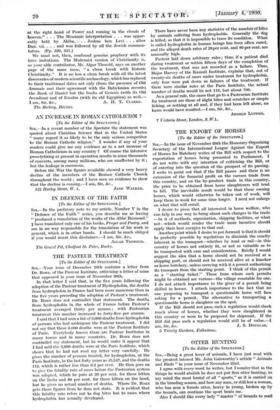THE EXPORT OF HORSES
[To the Editor of the SPECTATOR.]
Sin,—In the issue of November 30th the Honorary Organizing Secretary of the International League Against the Export of Horses for Butchery writes of the Bill with respect to the exportation of horses being presented to Parliament. I do not write with any intention of criticizing the Bill, or of entering into the question of the prospect of its passing. I write to point out that if the Bill passes and there is no extension of the financial profit on the carcass trade from this country, and on the by-product trade in this country, the price to be obtained from horse slaughterers will tend -to fall. The inevitable result would be that those owning horses, which would otherwise be taken - out of work, will keep them in work for some time longer. I need not enlarge on what that will entail.
I desire to press that all interested in horse welfare, who can help in any way to bring about such changes in the trade —be it of methods, organization, shipping facilities, or what not—which would render the trade more lucrative should apply their best energies to that end.
Another point which I desire to put forward is that it should be perfectly possible by regulations to diminish the cruelty inherent in the transport—whether by road or rail—in this country of horses not entirely fit, or not so valuable as to be transported with care and consideration. Briefly I would suggest the idea that a horse should not be received at a shipping port, or should not be received alive at a knacker or horse butchery, unless carrying with it a permit authorizing its transport from the starting point. I think of this permit as a "starting ticket." Those from whom such permits might be obtained are various—the village constable for one. I do not attach importance to the giver of a permit being skilled in horses. I attach importance to the fact that no one proposing to transport a questionable horse will face asking for a permit. The alternative to transporting a questionable horse is slaughter on the spot.
If the Bill should not pass, such a regulation would check much abuse of horses, whether they were slaughtered in this country or were to be proposed for shipment. If the Bill did pass such a regulation would still be of value.—I am, Sir, &c. J. S. DounLas. 5 Trinity Gardens, Folkestone.










































 Previous page
Previous page